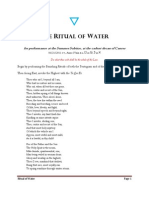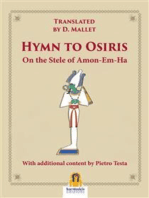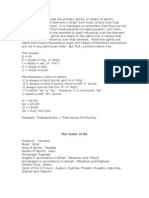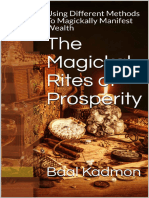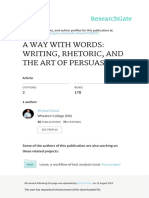0 ratings0% found this document useful (0 votes)
110 viewsRestantes Minutos E..
Restantes Minutos E..
Uploaded by
Patrick WestThis document discusses the nature of evocation and summoning spirits in chaos magic. It begins by providing an example of successfully summoning Santa Claus as a spirit, though Santa is a fictional entity. The document then explains how in chaos magic, repeated focus on an idea or concept can transform it into a godform with its own sentience. It questions whether widely believed concepts like Santa Claus could take on magical properties through collective belief. The rest of the document discusses experiences summoning the Olympian spirits and debates whether such spirits have objective or subjective existence. It concludes that the Olympians provide evidence that summoned spirits can communicate implicit knowledge about themselves, suggesting they are not merely psychological constructs.
Copyright:
© All Rights Reserved
Available Formats
Download as PDF, TXT or read online from Scribd
Restantes Minutos E..
Restantes Minutos E..
Uploaded by
Patrick West0 ratings0% found this document useful (0 votes)
110 views10 pagesThis document discusses the nature of evocation and summoning spirits in chaos magic. It begins by providing an example of successfully summoning Santa Claus as a spirit, though Santa is a fictional entity. The document then explains how in chaos magic, repeated focus on an idea or concept can transform it into a godform with its own sentience. It questions whether widely believed concepts like Santa Claus could take on magical properties through collective belief. The rest of the document discusses experiences summoning the Olympian spirits and debates whether such spirits have objective or subjective existence. It concludes that the Olympians provide evidence that summoned spirits can communicate implicit knowledge about themselves, suggesting they are not merely psychological constructs.
Original Description:
Info Screen
Original Title
A-03
Copyright
© © All Rights Reserved
Available Formats
PDF, TXT or read online from Scribd
Share this document
Did you find this document useful?
Is this content inappropriate?
This document discusses the nature of evocation and summoning spirits in chaos magic. It begins by providing an example of successfully summoning Santa Claus as a spirit, though Santa is a fictional entity. The document then explains how in chaos magic, repeated focus on an idea or concept can transform it into a godform with its own sentience. It questions whether widely believed concepts like Santa Claus could take on magical properties through collective belief. The rest of the document discusses experiences summoning the Olympian spirits and debates whether such spirits have objective or subjective existence. It concludes that the Olympians provide evidence that summoned spirits can communicate implicit knowledge about themselves, suggesting they are not merely psychological constructs.
Copyright:
© All Rights Reserved
Available Formats
Download as PDF, TXT or read online from Scribd
Download as pdf or txt
0 ratings0% found this document useful (0 votes)
110 views10 pagesRestantes Minutos E..
Restantes Minutos E..
Uploaded by
Patrick WestThis document discusses the nature of evocation and summoning spirits in chaos magic. It begins by providing an example of successfully summoning Santa Claus as a spirit, though Santa is a fictional entity. The document then explains how in chaos magic, repeated focus on an idea or concept can transform it into a godform with its own sentience. It questions whether widely believed concepts like Santa Claus could take on magical properties through collective belief. The rest of the document discusses experiences summoning the Olympian spirits and debates whether such spirits have objective or subjective existence. It concludes that the Olympians provide evidence that summoned spirits can communicate implicit knowledge about themselves, suggesting they are not merely psychological constructs.
Copyright:
© All Rights Reserved
Available Formats
Download as PDF, TXT or read online from Scribd
Download as pdf or txt
You are on page 1of 10
At a glance
Powered by AI
The key takeaways are that the text discusses the nature of the spirit Phul, evocation and chaos magic, and the importance of testing magic to determine if evocation is real.
Phul rules over the moon and lunar energy. It can turn any metal into silver in a symbolic sense, bringing things into lunar energy. Its time is Monday and its colors are white and purple.
The text discusses that in chaos magic, you can attempt to summon any spirit, even fictional ones like Santa Claus. It explains that evoking fictional spirits externalizes attitudes and perceptions to make them magically potent. It also discusses the idea of a 'Godform' that can take on sentience from collective belief.
PHUL
• 1
i ..
... 1
.......
Planet: Moon.
Uses: Phul rules all things corresponding to the
Moon, as well as providing familiar Spirits of the
water-who, it is said, can serve in visible and
bodily form-as well as converting any metal
into silver. (In the Arbatel, it says Phul can con-
vert any metal into silver in both word and deed
or action. This, 1think, demonstrates that these
uses are symbolic, as it is nonsense to say that
a word or action can be solidified into the raw
metal known as "silver". Nonsense in a grimoire
is a hint that something deeper is being referred
to. Turning things into silver refers to bringing
them into Lunar energy. The Moon, along with
Mercury, is the most magickal of the luminaries
in Western astrology, and much of what applies
to Ophiel applies to Phul.)
Time: Monday.
Colors:White background with a black or purple
sigi l.
Candles:White and purple.
restantes 13 minutos e...
Lamp:Purple or white .
Fragrance: Orchid.
restantes 13 minutos e...
Essay on the Nature of Reality and Evocation
Now that you know how to evoke the Olympicks
through this simple method, I'd like to discuss
sorne interesting questions about the nature of
evocation and chaos magick.
Basically, when you perform a chaos magick rit-
ual, you can attempt to summon any Spirit at all.
It could even theoretically be the Spirit of Santa
Claus (sorne people have done this. 1 haven't).
But, if it is something that obviously doesn't
exist and never existed (like the traditional idea
of Santa Claus), the question arises what exactly
is happening when the evocation is successf ul. As
in, if you feel a presence, see imagery on your
scrying mirror or are able to manifest results in
the form of a spell, and it is all based upan some-
thing fictitious like Santa Claus, what does this
mean?
The obvious answer is that you are simply ex-
ternalizing a group of attitudes and perceptions
you have and making them magickally potent.
Because you are objectif ying them in a ritual
context, your mind is working with them in a
new and more powerful way.Santa Claus doesn't
exist, but there is obviously power in the con-
cept, and if you've been raised in a Western
Christian background, Santa Claus has sorne as-
sociations with your childhood. You believed in
him at one time, and if that belief re-occurs later
in life, maybe something interesting can happen.
restantes 13 minutos e...
1use Santa Claus as an obviously absurd example.
However, what if there is more to it than that?
All around the world, hundreds of millions of
children believe in Santa Claus. His image is ev-
erywhere during certain times of the year, and as
a figure he has massive cultural influence. Could
the idea of Santa Claus theref ore be magickally
potent because it is given so much energy and
belief by so many people? Could the collective en-
ergy behind the idea of Santa Claus take on its
own existence and achieve a kind of sentiency?
This is actually the idea in chaos magick of
a "Godform", although an unintentional one.
Without going into too much detail, the typi-
cal chaos magick explanation is that desire can
be objectified through the form of a sigil (which
is basically like the seal s in a grimoire), but as
it gains energy it can increase into three other,
higher levels. The first is a Servitor, which is
where the desire takes on a kind of sentience
of its own and be directed like a living being.
You might say it is somewhat intelligent at this
point, whereas befare the sigil operated as brute
force. If more energy is added to it, it turns
into its second form, called an Egregore, which
is a type of collective thought form, even more
sentient than a servitor. Usually more than one
person is needed for this transformation. How-
ever, when a large group of people transfer their
energy to an Egregore, it then becomes even
greater, transforming into a Godform.As a God-
form, it takes on a total life of its own and is
restantes 13 minutos e... 60°/o
able to usurp its own energy independent of the
minds which gave rise to it. It is a created god, if
you will.
Theoretically, if there was such a magickally po-
tent aspect to Santa Claus, it would be because of
a model similar to this. Chaos magick describes
this type of phenomena in this way. However,
sorne have concluded that Spirits in general fol-
low this basic model and have no true indepen-
dent existence. They, too, are Godforms or Egre-
gores of bygone ages. Magick is then looked upon
as a form of psychological self-manipulation . It
does have paranormal and occult results, but
this has less to do with contacting objective enti-
ties and more to do with learning how to harness
and express one's own psychic energy through
such tools as belief, concentration, ecstasy, etc.
As such, the beings described in the various old
grimoires of Europe, the Middle East, India and
China, etc. are taken as aspects of oneself rather
than objectively existent entities.
But how would you know? In theory, there's
nothing a Godform would do or look like that
wouldn't also apply to an objectively existing
Spirit. It's a non-falsifiable position, for if a God-
form can act independently of its creators, it
resembles an objectively existent being in all ob-
servable ways.At this point, it really all depends
on what theory you want to subscribe to.
The paradigm of old European ceremonial mag-
ick, however, always assumes that these Spirits
have an objective existence independent of the
restantes 12 minutos e...
sorcerer. They may be infernal Spirits, like the
demons of the Goetia, or planetary Spirits like
the Arbatel describes, but there is no concept
that they are somehow a part of our own psy-
che. It is accepted that they are literal angels
and demons and the sorcerer treats them as
such. The entire apparatus of the rituals asso-
ciated with them, in fact, is based upon this
understanding. Thus angels are supplicated in
a reverential manner, whereas rituals involving
demons are performed with many precautions
in place and once the demon actually appears,
it is kept on a tight leash. In our modern age,
we might think that this viewpoint is outdated
and that we know better now, but is that really
the case? What actually happens when we evoke
these Spirits, and how does it compare to evoca-
tions of obviously fictional beings?
The Olympicks provide an interesting clue, 1
think. As 1 said, there is really no way to de-
termine if they are Godforms or not, as a God-
form supposedly has all the aspects of an objec-
tive being, but, personally, my experience of the
Olympicks is very different than evocations of
outright fictions. Evoking them is also different
than evoking an insentient sigil as part of a spell.
And, yes, it is very easy for a critic to sit back
and say that this is simply due to suggestion or
an over-active imagination, but 1am not so sure.
1was first introduced to magick through chaos
magick and it was only after meeting ceremo-
nial magicians who operated with old grimoires
that 1 began to work them myself-albeit in a
restantes 11minutos e...
chaos magick style. But 1 was very comfortable
with the idea that these Spirits were elements of
my own psyche. Repeated experiences, however,
have forced me to question this model.
Having said that, the method 1describe of evok-
ing them is not the method described in the
Arbatel. It is a simplified technique that uses
the sigil of the Spirit in question and sorne
basic planetary correspondences to heighten the
effect. That is all. Nevertheless , it is very power-
ful. 1have experimented with more traditional
forms of evocation-yes, even reciting prayers in
Latin to the Christian Gods-and 1 can say that
1 far prefer my own meditative and simplified
method.But, actually, 1have found that even the
simple visualization of its sigil can call up an ex-
perience of the Olympick . It is not quite as in-
tense as the ritual, but the presence is certainly
there.
What are the implications of this? 1 think it's
clear that the Spirits spoken of in old grimoires
can be summoned through many different
methods. The use of Latin prayers, for example,
is something that is obviously contrived and
makes little sense when many of these Spir-
its have Hebrew, Persian or Egyptian names. Of
course, Latin prayers can be very useful to some-
one who was raised going to Latin masses all
their life and for whom Latin feels like a "holy
language",just as 1611King James English often
seems like a "holy language" to English speakers.
The point is not the details of the method, but
restantes 11minutos e... 70°/o
how the method impacts the magician. Colored
lamps, for example, always seem to make my
evocations much more vivid and intense. In the
past 1made more use of incenses and fragrances,
and these, too, had a great effect-although, per-
sonally, 1think lighting is more important. So it
is not the case that grimoires are infallible books
which must be followed to the letter. They de-
scribe the Spirits and a method to contact them,
but the most important factor is the magician-
not the method.
As to the question of whether these Spirits are
objective or subjective, however, the Olympicks
serve as a very illuminating case in point: as 1
stated earlier, all names of the Olympicks have
meanings, sorne of which are easier to find out
than others. However, if you evoke them having
no idea what their names mean, and find out
that you receive impressions from them which
reveal the name's meaning or aspects of its
meaning, then it is quite clear that there is an
objective component to their existence. A person
could say that all knowledge is subjective, ulti-
mately, and this may be true-we may be able
to tap into any form of knowledge in the cos-
mos because we are microcosms ourselves, and
contain the entire universe within us-but if you
get information from a Spirit which you weren't
aware of previously, there's nothing about this
experience that says it is wholly subjective. And
even if it is tapping into a universal memory la-
tent within ourselves, still, that universal mem-
ory must have an objective aspect which is above
restantes 10 minutos e...
and beyond our own existence. At a certain
point, we're not just imagining things anymore:
reality begins to intrude, and we come to realize
evocation, and magick in general,is very real.
This is just one example. There are many ex-
periments you can conduct. In fact, I think the
future of magick is going to be a greater and
more complex incorporation of ancient Spirits.
Bast, for instance, is a remarkable Spirit from
the old Egyptian pantheon and is very much
alive. Theoretically, by using sorne of the open
methods of chaos magick, one has access to
the entire plethora of ancient Spirits, no matter
what culture or time period . True, you may find
that sorne of them had a strictly ideological ex-
istence, and were only there to serve the inter-
ests of priests and kings, but this isn't the case
with all of them. And you do not need to take
my word for it, for the methods described here
with the Olympicks can be applied to any Spirit.
In my book on Evocation Through Sigil M agick , I
describe in detail how any Spirit may be sum-
moned. Once this is known, the rest is simple
experimentation.
Yet this is not to say that everything which is
communicated in an evocation is actually real,
in an objective sense. To think otherwise is dan-
gerous. A thousand thoughts will flood your
mind in evocation, and it takes much skill and
self-honesty to determine what corresponds to
the actual evocation and what is simply your
imagination . You can enjoy the experience of a
restantes 8 minutos en...
Spirit, but a good rule is to not believe anything
the Spirit tells you-or appears to tell you-un-
less you can verify it, objectively. If it is truly
a disembodied intelligence present in the room
with you, and is aware of you in a conscious
and personal way, then you can expect that it is
not going to speak in vague generalities. Though
1 am mostly a solitary practitioner of magick
now, in the past 1 associated with a few other
magicians. What always struck me about them,
though, was that they were not interested in
concrete, tangible and factual results. It seemed
like magick was more of a faith for them than an
experiential path. They were content to have the
Spirits convey these vague, fortune-cookie like
pieces of self-help advice, and would far rather
smoke pot while looking at old Hermetic designs
instead of using magick to, say, help acquire a
decent job . 1 think it was because they needed
magick to feel special about themselves, as they
were economically disadvantaged and powerless
in their society, and magick gave them a sense of
power and uniqueness. So it worked like a faith.
And "God works in mysterious ways", as people
say-which means he does not work at all. This is
why testing magick out and seeing if there is an
objective basis is so important: you may find evo-
cation fun and exciting, but is it real?
That being said, tangible results may not appear
quickly.With spells, you can usually tell within a
few weeks whether it worked or not, depending
on what the spell is, but evocations are a differ-
ent situation. It appears to me that Spirits have a
restantes 7 minutos en...
You might also like
- Position-Paper (Nature VS Nurture)Document4 pagesPosition-Paper (Nature VS Nurture)Nica LagrimasNo ratings yet
- Psalm 1 "El Chad" (One God) : (Genesis 2-3Document44 pagesPsalm 1 "El Chad" (One God) : (Genesis 2-3MadeleiGOOGYXNo ratings yet
- The End of MaraDocument5 pagesThe End of Marajanhendrik4444No ratings yet
- The Great Blessing of The WatersDocument15 pagesThe Great Blessing of The WatersAndreas Borges de Carvalho100% (1)
- Approximating The Shapiro-Wilk W-Test For Non-NormalityDocument3 pagesApproximating The Shapiro-Wilk W-Test For Non-NormalityOsman HamdiNo ratings yet
- News Corp. Walt Disney Co. Time Warner Inc. CBS Corp. Critical Success Factors WeightDocument8 pagesNews Corp. Walt Disney Co. Time Warner Inc. CBS Corp. Critical Success Factors WeightLESLIE ANN ARGUELLESNo ratings yet
- SR PolarDocument1 pageSR PolaramritrathNo ratings yet
- DocumentoDocument107 pagesDocumentoFurfur MurmurNo ratings yet
- The First InvocationDocument3 pagesThe First InvocationPompy Joe100% (1)
- Solar Invocation Genius SaltDocument3 pagesSolar Invocation Genius Saltdancinggoat23100% (1)
- Driver LicenceDocument104 pagesDriver LicenceAngy BouquetteNo ratings yet
- Invocation TalkDocument5 pagesInvocation TalkYuri M100% (1)
- ST Martin La Tres Saints TrinosophieDocument23 pagesST Martin La Tres Saints TrinosophieMarc TSNo ratings yet
- Simple MagicDocument6 pagesSimple Magickeglon002No ratings yet
- Makeshift Elemental ConjurationDocument2 pagesMakeshift Elemental ConjurationRhaxma Conspiracy100% (1)
- Study On Spiritual Vibrations Emitted by A CandleDocument13 pagesStudy On Spiritual Vibrations Emitted by A Candleशशांक शेखर शुल्बNo ratings yet
- Invocation of Movement & Rest - Numbers 10-35-36Document4 pagesInvocation of Movement & Rest - Numbers 10-35-36Marcos MarcondesNo ratings yet
- The Ritual of WaterDocument4 pagesThe Ritual of WaterHierophage100% (1)
- The Ritual of The Flaming StarDocument5 pagesThe Ritual of The Flaming StarAnamaria NazaroviciNo ratings yet
- 2019 - 5 Jan-Theophany - Great HoursDocument26 pages2019 - 5 Jan-Theophany - Great HoursMarguerite PaizisNo ratings yet
- Theurgia or The Egyptian MysteriesDocument214 pagesTheurgia or The Egyptian MysteriesDylan BenekeNo ratings yet
- Unveiling The Mystery of Praise and ThanksgivingDocument3 pagesUnveiling The Mystery of Praise and ThanksgivingChima Christopher0% (1)
- The Key of Knowledge (Clavicula Salomonis) Add. MS. 36674Document40 pagesThe Key of Knowledge (Clavicula Salomonis) Add. MS. 36674DuddeNo ratings yet
- Earth Elemental InitiationDocument3 pagesEarth Elemental Initiationdancinggoat23100% (1)
- AngelsDocument2 pagesAngelsemeki200297000% (1)
- Mysteries of The Gnostic EasterDocument10 pagesMysteries of The Gnostic EasterAli Ghasemi Koohi Kheili100% (1)
- The Ion of Pope Leo III Sara Kane TransDocument53 pagesThe Ion of Pope Leo III Sara Kane TransRobert OctaviaNo ratings yet
- Invocation 19Document48 pagesInvocation 19Daryl WallisNo ratings yet
- Ana BChoachDocument1 pageAna BChoachAyodele OyedeleNo ratings yet
- KADOSHDocument1 pageKADOSHJolly Walter- RubinNo ratings yet
- Supreme Invoking Ritual of The PentagramDocument7 pagesSupreme Invoking Ritual of The PentagramruachtecNo ratings yet
- Michaelangelo 000Document27 pagesMichaelangelo 000gannwongNo ratings yet
- Ephphatha - Healing of Christ and Sufi InvocationDocument3 pagesEphphatha - Healing of Christ and Sufi Invocationmubeen100% (2)
- Lost Love SpellDocument1 pageLost Love SpellAmber McDonaldNo ratings yet
- Birthday RitualDocument2 pagesBirthday Ritualcarlos incognitosNo ratings yet
- List of Known Wind Spells: Aptitude: Come Forth, Wind!Document2 pagesList of Known Wind Spells: Aptitude: Come Forth, Wind!Link PelcherNo ratings yet
- Agrippa Henri-Corneille - La Philosophie Occulte Ou La Magie de Henri-Corneille Agrippa Livre 1 PDFDocument247 pagesAgrippa Henri-Corneille - La Philosophie Occulte Ou La Magie de Henri-Corneille Agrippa Livre 1 PDFBORALNo ratings yet
- First Pentacle of Saturn Compelling People and Spi - 230511 - 144311Document5 pagesFirst Pentacle of Saturn Compelling People and Spi - 230511 - 144311girlnextdoor3210No ratings yet
- (Adrpg Power) Elemental SummoningDocument2 pages(Adrpg Power) Elemental SummoningWill HarperNo ratings yet
- Illuminated Pentagrammic PyramidDocument3 pagesIlluminated Pentagrammic PyramidWilliam Liu0% (1)
- Set of SandalphonDocument2 pagesSet of Sandalphonliberwicca100% (2)
- Bedtime ShemaDocument15 pagesBedtime ShemaBri GipsonNo ratings yet
- CLF-The Secret Door To SuccessDocument1 pageCLF-The Secret Door To SuccessScoots AlanNo ratings yet
- The Spell of Egypt by Hichens, Robert Smythe, 1864-1950Document56 pagesThe Spell of Egypt by Hichens, Robert Smythe, 1864-1950Gutenberg.orgNo ratings yet
- Magickal Hymns To ChronosDocument2 pagesMagickal Hymns To ChronosSelena Astarte100% (1)
- Conjurations by Samael Aun Weor PDFDocument1 pageConjurations by Samael Aun Weor PDFDaniel Frcko100% (1)
- (Ebook - PDF - Occult) HeptameronDocument23 pages(Ebook - PDF - Occult) HeptameronJim HoseinNo ratings yet
- Grimoire Encyclopædia: Divination by The Word of Uriel (Spell)Document4 pagesGrimoire Encyclopædia: Divination by The Word of Uriel (Spell)AnthonyNo ratings yet
- Esprits ElementauxDocument5 pagesEsprits ElementauxHeka KheperaNo ratings yet
- Conduit of Divine Blessing RitualDocument2 pagesConduit of Divine Blessing RitualJuan Pablo Valcarcel VillegasNo ratings yet
- The Magickal Rites of Prosperit - Baal KadmonDocument97 pagesThe Magickal Rites of Prosperit - Baal Kadmonlatinocarlos84100% (1)
- The Key of SolomonDocument41 pagesThe Key of SolomonHalb95No ratings yet
- Zadkiel InfoDocument1 pageZadkiel InfoPersephoneNo ratings yet
- Pronunciation Guide To Sephiroth Letters and Divine Names PDFDocument6 pagesPronunciation Guide To Sephiroth Letters and Divine Names PDFcyberdemon08No ratings yet
- Experiential Account of Gnome EvocationDocument2 pagesExperiential Account of Gnome EvocationNokatin Horcos100% (1)
- List of Known Fire Spells: Aptitude: Come Forth, Fire!Document2 pagesList of Known Fire Spells: Aptitude: Come Forth, Fire!Link PelcherNo ratings yet
- Psalms to Inspire: Powerful Book of Psalms to Pray, Protect, and InspireFrom EverandPsalms to Inspire: Powerful Book of Psalms to Pray, Protect, and InspireNo ratings yet
- Pure Ecstacy Right Now.: 20 Minutos E... 7%Document1 pagePure Ecstacy Right Now.: 20 Minutos E... 7%Patrick WestNo ratings yet
- 21 Minutos E... 6%Document1 page21 Minutos E... 6%Patrick WestNo ratings yet
- Minutos E..Document1 pageMinutos E..Patrick WestNo ratings yet
- What Is The Holy Guardian Angel?: 22 Minutos E... 6%Document1 pageWhat Is The Holy Guardian Angel?: 22 Minutos E... 6%Patrick WestNo ratings yet
- Because. Instead of The Body Fighting You It Will Work With You Bccausc It Increases The Yang Chi Intake. This Water Memory and Gives A Longer LifeDocument1 pageBecause. Instead of The Body Fighting You It Will Work With You Bccausc It Increases The Yang Chi Intake. This Water Memory and Gives A Longer LifePatrick WestNo ratings yet
- Caution: OperationDocument2 pagesCaution: OperationPatrick WestNo ratings yet
- Chapter ThreeDocument1 pageChapter ThreePatrick WestNo ratings yet
- Colors:An Orange Background With A Black Sigil Candles:Light Green and White, or All Black. Lamp Orange Fragrance: MyrrhDocument5 pagesColors:An Orange Background With A Black Sigil Candles:Light Green and White, or All Black. Lamp Orange Fragrance: MyrrhPatrick WestNo ratings yet
- RecrpeDocument1 pageRecrpePatrick WestNo ratings yet
- ReopeDocument1 pageReopePatrick WestNo ratings yet
- Arbatel: Restantes Minutos E..Document10 pagesArbatel: Restantes Minutos E..Patrick WestNo ratings yet
- Preface: "BalanceDocument1 pagePreface: "BalancePatrick WestNo ratings yet
- Immortality and Age Manipu-Lation Handbook by S RobDocument1 pageImmortality and Age Manipu-Lation Handbook by S RobPatrick WestNo ratings yet
- Introd Uction: Posición 9Document10 pagesIntrod Uction: Posición 9Patrick WestNo ratings yet
- HorasDocument1 pageHorasPatrick WestNo ratings yet
- The Initial Soul Mirrors: HorasDocument1 pageThe Initial Soul Mirrors: HorasPatrick WestNo ratings yet
- The Kyballion.: HorasDocument1 pageThe Kyballion.: HorasPatrick WestNo ratings yet
- Assessment Construction Final DraftDocument25 pagesAssessment Construction Final Draftapi-220363031No ratings yet
- Opinion EssayDocument2 pagesOpinion EssayNaroha Perea lucasNo ratings yet
- A. Instructions (Enumeration) C. Instructions (Organizing Concepts)Document1 pageA. Instructions (Enumeration) C. Instructions (Organizing Concepts)Orlando Jr. VinculadoNo ratings yet
- L2 The SelfDocument44 pagesL2 The SelfEmailNo ratings yet
- AspectsDocument4 pagesAspectsClark Stillman100% (1)
- Fados 9 F 1Document39 pagesFados 9 F 1cjtrybiecNo ratings yet
- Retail ManagementDocument115 pagesRetail ManagementMaddy ManojNo ratings yet
- Agile Methodology: The Complete Guide To Understanding Agile TestingDocument17 pagesAgile Methodology: The Complete Guide To Understanding Agile Testingrp03xxNo ratings yet
- Republic Vs HidalgoDocument2 pagesRepublic Vs HidalgoIñigo Mathay Rojas100% (4)
- SMKN 3 Gorontalo Leger Nilai Siswa Kelas 12Tp - 3 Tahun Pelajaran: 2017 / 2018, Semester: 1Document4 pagesSMKN 3 Gorontalo Leger Nilai Siswa Kelas 12Tp - 3 Tahun Pelajaran: 2017 / 2018, Semester: 1Ambarwaty BilondatuNo ratings yet
- LABORATORY EXERCISE The Gastrointestinal System With Accessory GlandDocument5 pagesLABORATORY EXERCISE The Gastrointestinal System With Accessory GlandGelo AlonzoNo ratings yet
- Calculation of Load Capacity of Gears in Random Varying Exploitation ConditionsDocument9 pagesCalculation of Load Capacity of Gears in Random Varying Exploitation ConditionsthisisjineshNo ratings yet
- A Way With Words I - The Modern Scholar TMSDocument83 pagesA Way With Words I - The Modern Scholar TMSAdjeNo ratings yet
- FS 1 Episodes 1 10Document66 pagesFS 1 Episodes 1 10rosela fainaNo ratings yet
- Networks of Communication and Exchange: 300 B.C.E. - 1100 C.EDocument39 pagesNetworks of Communication and Exchange: 300 B.C.E. - 1100 C.ELucas RyanNo ratings yet
- International Law EthicsDocument23 pagesInternational Law Ethicsaaditya0% (1)
- Korranberg Chronicle-1 1Document7 pagesKorranberg Chronicle-1 1VNo ratings yet
- Gangrel Antitribu CityDocument1 pageGangrel Antitribu CityKasper AchtonNo ratings yet
- NARAYANA Project WorkDocument102 pagesNARAYANA Project Worknaveen chitiralaNo ratings yet
- Delirium in Elderly Patients - Prospective Prevalence Across Hospital Services-2020Document7 pagesDelirium in Elderly Patients - Prospective Prevalence Across Hospital Services-2020Juan ParedesNo ratings yet
- Analytical Chemistry Experiment 4Document6 pagesAnalytical Chemistry Experiment 4Ngoh KexuanNo ratings yet
- Lesson 8: Autobiography, Biography, Personal Narrative, and Travelogue Lesson 8: Autobiography, Biography, Personal Narrative, and TravelogueDocument25 pagesLesson 8: Autobiography, Biography, Personal Narrative, and Travelogue Lesson 8: Autobiography, Biography, Personal Narrative, and TravelogueEthel BustamanteNo ratings yet
- G.R. No. 191458, July 03, 2017 - Chinatrust (Phils.) Commercial Bank, Petitioner vs. Philip Turner, RespondentDocument2 pagesG.R. No. 191458, July 03, 2017 - Chinatrust (Phils.) Commercial Bank, Petitioner vs. Philip Turner, RespondentFrancis Coronel Jr.No ratings yet
- VedicMaths 07Document12 pagesVedicMaths 07venicebatto0730No ratings yet
- Learning Objectives:: Case 6. Epidemic AsthmaDocument13 pagesLearning Objectives:: Case 6. Epidemic AsthmaGaluh Ajeng PangestikaNo ratings yet
- Theory Edward Lee ThorndikeDocument5 pagesTheory Edward Lee ThorndikehibaNo ratings yet

















